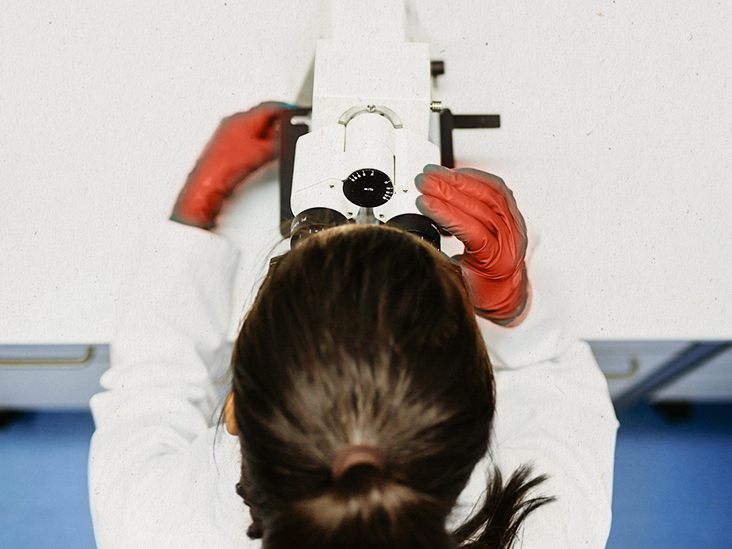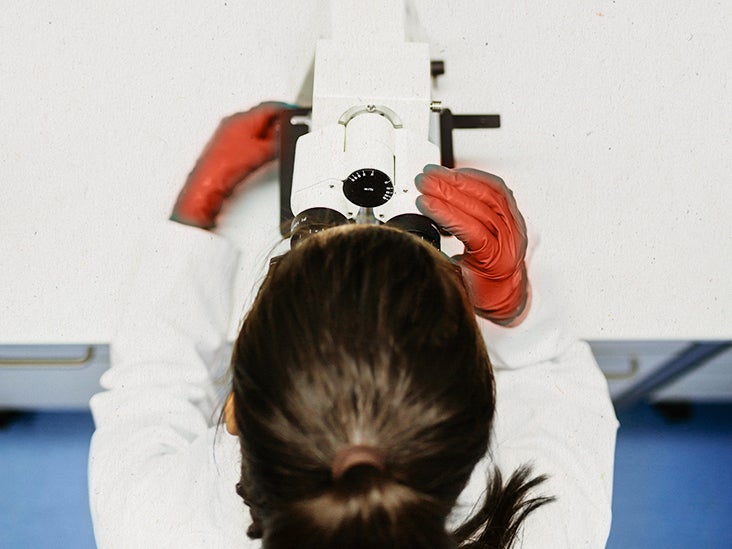

At present there is no vaccine for HIV. However, one may be possible in the future. Scientists continue to research and investigate the possibility.
Scientists have performed a phase 1 clinical trial which confirmed that the first stage of a potential HIV vaccination is safe, and may be effective in working against HIV.
HIV is a virus that progressively weakens the immune system, and affects more than
Treatments for HIV are lifelong, and the mental and physical health effects of the virus remain challenging for many. In some parts of the world access to treatments and prevention is limited, resulting in
Keep reading to learn more about a potential HIV vaccine, some alternative HIV prevention options, an overview of treatment options, and the general outlook for the condition.
According to the International AIDS Vaccine Initiative (IAVI), researchers have failed to produce an effective HIV vaccine, despite decades of work, because of the nature of the virus.
Most of the surface of the virus is coated with sugar molecules, which do not trigger an immune response. This makes it difficult to produce a vaccine, as vaccines are focused on triggering a slight immune response in a person in order to build up antibodies. Additionally, the parts of the HIV virus that are exposed are extremely variable. This makes it difficult to produce a vaccine that would be effective in all cases of the virus.
Like the virus which causes COVID-19, HIV has spike proteins on its surface that it uses to gain entry to host cells.
However, the genes that make up the HIV spike proteins are very effective at rapidly mutating. This results in millions of different HIV strains. Because of this, it is difficult to find antibodies that can neutralize all the different strains.
There are various HIV prevention methods, including:
Medication
PEP: If a person is exposed to HIV through bodily fluids like semen, vaginal fluid, or blood, they should talk to a healthcare provider about taking
PEP refers to taking medication to prevent HIV after possible exposure, and must be started within 72 hours of the exposure. People should take PEP for 28 days, in the form of pills.
If a person takes PEP according to instructions, it is highly effective at preventing HIV. The medication is safe but may cause side effects such as nausea.
PrEP: If a person is at increased risk of exposure to HIV, they should consider
PrEP is medication for people at risk of HIV, such as those who face repeated or ongoing exposure to the virus. If people take it correctly according to prescription, it is highly effective at preventing HIV from sex or the use of shared needles.
There are two medications approved for use as PrEP. Truvada is for all people at risk of HIV through sex or injection drug use. Descovy is for people at risk through sex, except people assigned female at birth who are at risk of contracting HIV through vaginal sex.
PrEP is safe, but may cause side effects including headaches, nausea, and fatigue.
ART: If a person with HIV is taking the medications prescribed for
ART can reduce the viral load to the point where it becomes undetectable. People with an undetectable viral load have no risk of transmitting the disease to others through sex or needle sharing, or to babies from pregnancy, birth, and breastfeeding.
Inappropriately discarded drugs can harm people, animals, and the environment. It is essential to dispose of any unwanted medication safely. Read our guide on medication disposal here.
During sex
- Using condoms is highly effective at preventing HIV and other sexually transmitted infections (STIs).
- People should use silicone or water-based lubricants to help stop condoms from slipping or breaking during sex.
- A person could choose types of sex that are less risky. There is
very little risk of contracting HIV through oral sex, compared to vaginal or anal sex. - If a person has HIV, ART can make their viral load undetectable so they don’t pass on the virus.
Drug use
- A person should avoid sharing needles, syringes, or other drug injection equipment.
- People who use drug injection equipment should use new, clean equipment each time they inject. Many communities offer syringe service programs (SSPs), which give out new needles and safely dispose of old ones.
- People who do share drug injection equipment should take PrEP as prescribed.
- People should avoid having sex while high on drugs, as they will be more likely to engage in risky sexual behaviors.
- People who do share drug injection equipment should
clean it with bleach . A disinfected syringe is not as safe as a new, sterile syringe, but can reduce the risk of HIV and viral hepatitis. - A person should speak to a healthcare provider or counselor if they are struggling with substance abuse disorder.
Seeking help for addiction may seem daunting or even scary, but several organizations can provide support. If you believe that you or someone close to you is struggling with addiction, you can contact the following organizations for immediate help and advice:
Mother to baby transmission
- Mothers who want to prevent transmitting HIV to their babies should get tested as soon as possible. Early diagnosis and treatment can help prevent transmission to the baby more effectively.
- If a mother has sexual partners who engage in high-risk behaviors, they should get tested again in their third trimester of pregnancy.
- If a person is considering becoming pregnant and has a partner with HIV, they should consider taking PrEP. This may help protect them and their baby from contracting HIV while the mother is pregnant, during pregnancy, and while breastfeeding.
- A person who has HIV should take ART as prescribed throughout their pregnancy and childbirth. A doctor may prescribe the baby ART for
4–6 weeks after birth. - A person with HIV should avoid breastfeeding the baby to reduce the risk of transmission.
People with HIV are treated with antiretroviral therapy (ART). People on ART take a combination of HIV medications every day. This is called an HIV treatment regimen.
ART is recommended for everyone who has HIV. The treatment prevents the virus from multiplying, which reduces the amount of HIV in the blood, known as the viral load. Less HIV in the body means the immune system is protected, and prevents HIV from advancing to AIDS.
ART is not a cure for HIV, but helps people with HIV live longer, healthier lives.
As ART reduces the viral load of HIV, it also reduces the risk of transmission.
The only way for a person to be diagnosed with HIV is for them to have an HIV test. The
If a person gets a test in a lab or healthcare setting, a healthcare provider or lab technician will take a sample of their blood. If it is a rapid test, a person may be able to wait there for their results. If not, it can take up to several days for a person to receive their results.
If the test result is positive, healthcare professionals will conduct follow-up tests to confirm infection and measure the viral load. Counselors will be able to answer questions about the diagnosis and provide referrals for treatment.
HIV treatment is lifelong. While there is currently no cure for or vaccine against HIV, a person can control it with proper medical care and ART. Most people get control of the virus within
ART is recommended for all people with HIV, regardless of how healthy they are or how long they have had the virus. People should start treatment as soon as possible. If a person delays treatment, the virus will continue to harm their immune system, will put them at higher risk of developing AIDS, and will increase the risk of transmitting the virus to their sexual partners.
Treatment is usually very well-tolerated but can cause side effects in some people, including:
- nausea and vomiting
- diarrhea
- difficulty sleeping
- dry mouth
- headache
- rash
- dizziness
- fatigue
- pain
A positive HIV diagnosis can also result in
There are many organizations that offer support for people with HIV. The
HIV care and treatment
Learn about HIV stigma and discrimination
Find mental health treatment
Find help paying for HIV care
Other organizations include:
While there is no vaccine for HIV, there may be one in the future, as scientists are attaining good results from early clinical trials.
There are various prevention methods for HIV, including medication, safer sex practices, and HIV-safe drug practices.
Treatment for HIV is antiretroviral therapy, an HIV treatment regimen that includes taking medication daily.
HIV testing is the only way to diagnose the condition. After diagnosis, a person should start treatment as soon as possible in order to reduce their viral load.
HIV can have a physical, mental, and emotional impact. Seeking professional medical help is very important.